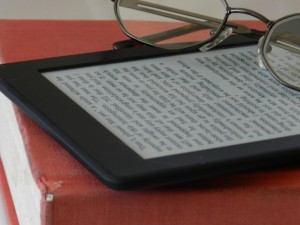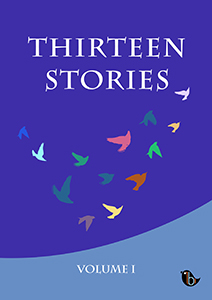 When e-readers first began making appearances, I besmirched them. I was going to be a traditionalist, damnit. I didn’t want to read things digitally. How could that compare? A digital book? Ewww. It’d be like reading on a computer As for getting published in e-format, it seemed cheap. I wanted the texture of a book, to feel the pages under my fingertips, to smell the print, to be impressed by the glossy cover, and all those other tactile sensations that make books so real and attractive to us.
When e-readers first began making appearances, I besmirched them. I was going to be a traditionalist, damnit. I didn’t want to read things digitally. How could that compare? A digital book? Ewww. It’d be like reading on a computer As for getting published in e-format, it seemed cheap. I wanted the texture of a book, to feel the pages under my fingertips, to smell the print, to be impressed by the glossy cover, and all those other tactile sensations that make books so real and attractive to us.
But gradually, I’ve become a convert. No, I haven’t thrown all my books out. They’re still piling up and spilling out from my bookshelves. I do own a Kindle, though, (one which has files spilling out of it now of ebooks that I one day plan to read).
Here’s some of the reasons I was won over …
A well-formatted ebook is aesthetically as attractive as a printed book
A lot of people use formulas to convert Word documents into ebooks. This usually leads to every paragraph being indented, additional line-spacing between paragraphs, and some other aberrations that you don’t see in standard books. It’s an eyesore – to me, at least. But some people craft the appearance of ebooks: beautiful covers, the headings and text formatted just as you’d find in a printed book. Obviously, you can’t (or least technology hasn’t yet) duplicated print quality, but it’s damn close.
Accessibility
So, just for example, I want Blaise van Hecke’s new novel, but she’s been published in Netherlands by a small publisher. I either have to wait until the book gets distribution here, or find somewhere international that will distribute. Even Amazon will take a month or so to deliver a hardcopy book. But I want this book now, damnit! Finding that same book as an ebook on Amazon will take a minute. Ordering it and having it delivered to my Kindle is virtually instantaneous.
Syncing
A lot of people don’t realise that you can get a Kindle app for your PC, Mac, iPad, or smartphone. Download it (for free), install it, and it works exactly as a Kindle does. These apps also sync. So I’m reading van Hecke’s new novel in the tub on my Kindle and get up to page 50. On the train to work, I take out my smartphone and open the book on my Kindle app. The app immediately syncs where I’m up to and opens the book at page 50. I read up to page 75. At work, I take out my iPad to pretend to work, but continue reading instead. Immediately, the iPad opens the book up to page 75. Pretty nifty, huh?
Space
Books line the shelves of my bookshelf. Then they’re stacked on top of other books, and on the roof of the bookshelf. There’s some precariously balanced piles there that need only the wrong book plucked out, and they’ll collapse – quite possibly on my head. Then there’s a serious concussion, a hospital stay, time off work, an inability to pay the bills, my house is taken from me, and there, my life is in ruins, all because I tried to find one book. An e-reader (whether it’s an e-reader like Kindle, Kobo, or Sony, or just an app on your phone) can hold numerous books and takes up barely any space.
Expense
Ebooks are cheaper than printed books. Also, you can find the classics that have fallen into public domain (e.g. Jane Austen, Herman Melville, Charles Dickens, et al) for FREE. Just download them and away you go. If you’ve just gotten an e-reader, it’s a great starting point for reading. On the flip side, if you wanted to self-publish, theoretically, you could do it for free and self-publish on Amazon, (although you would be encouraged to spare the expense for good editing, conversion, and a cover – still, a fraction of what it costs to self-publish a hardcopy).
Improve readability
Ever bought a book with tiny print and strained your eyes to the point that you’ve almost suffered an embolism? Well, perhaps not, but we do all know about eye-strain, particularly as we get older. E-readers allow us to change the font size of books, making the text larger and easier on the eyes.
 I’ll still buy hardcopy books. I love them too much not to. And they still have their benefits – print quality, those tactile sensations we love, lineage, the ability to throw it at somebody annoying us without breaking it, amongst other things. But ebooks have developed into a viable complement – I won’t use the word ‘alternative’, since that would suggest it’s one or the other, and you can have both.
I’ll still buy hardcopy books. I love them too much not to. And they still have their benefits – print quality, those tactile sensations we love, lineage, the ability to throw it at somebody annoying us without breaking it, amongst other things. But ebooks have developed into a viable complement – I won’t use the word ‘alternative’, since that would suggest it’s one or the other, and you can have both.
To that end, Busybird has also entered the ebook market, with the publication of our first ebook anthology, Thirteen Stories – Volume I, which contains a collection of short stories from thirteen authors published in Australian journals. Check it out right here: Thirteen Stories.
LZ.
